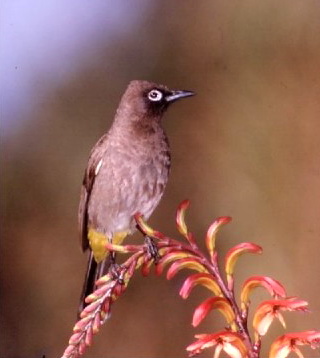Cape Bulbul
From Wikipedia, the free encyclopedia
[Photo] Cape Bulbul (Pycnonotus capensis), Kaapse Tiptol. Source: Fernkloof Nature Reserve (http://fernkloof.com/species.mv?1165), cropped.
The Cape Bulbul, Pycnonotus capensis, is a member of the bulbul family of passerine birds. It is an endemic resident breeder in coastal bush, open forest, gardens and fynbos in southern South Africa. This species nests mainly in the southern spring from September to November. The nest is thick walled cup concealed by foliage in a small tree or shrub.
Identification
The Cape Bulbul is 19-21 cm long, mainly dull, blackish brown with a diagnostic white eye-ring, and yellow undertail coverts. The head has a small crest. The short, straight bill, legs and feet are black and the iris is dark brown. The sexes are similar in plumage.
This species is much darker than the other South African bulbuls, and differs in the eye ring colour and brown lower belly, whereas the other dark bulbuls have a pale lower belly. The dark belly helps to identify juveniles, which lack the distinctive eye ring of the adult.
Behaviour
The Cape Bulbul is a common and conspicuous bird, which tends to perch at the top of a bush. It is active and noisy, usually seen in pairs or small groups foraging for fruit, nectar and insects.
The most typical call of this species is a liquid whistle of two or more varied notes pit-peet-pitmajol, piet-piet-patata.
http://en.wikipedia.org/wiki/Cape_Bulbul
| The text in this page is based on the copyrighted Wikipedia article shown in above URL. It is used under the GNU Free Documentation License. You may redistribute it, verbatim or modified, providing that you comply with the terms of the GFDL. |
|

